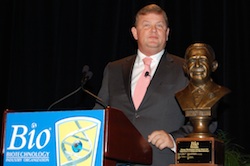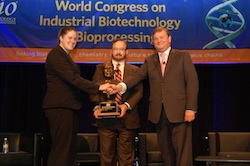 Royal DSM Ceo Feike Sijbesma has received the George Washington Carver Award for Innovation in Industrial Biotechnology during BIO World Congress. In its 4th year, Sijbesma is being honored as a visionary leader of the bio-economy, an industry that the World Economic Forum projects will contribute nearly $250 billion to the world economy by 2020. Under his leadership, DSM has made several instrumental contributions in the development of industrial biotechnology that includes biochemicals, biofuels, health and nutrition and supporting sustainable development.
Royal DSM Ceo Feike Sijbesma has received the George Washington Carver Award for Innovation in Industrial Biotechnology during BIO World Congress. In its 4th year, Sijbesma is being honored as a visionary leader of the bio-economy, an industry that the World Economic Forum projects will contribute nearly $250 billion to the world economy by 2020. Under his leadership, DSM has made several instrumental contributions in the development of industrial biotechnology that includes biochemicals, biofuels, health and nutrition and supporting sustainable development.
Sijbesma believes that over the next 100 years, the world will be shifting away from the Fossil Age into the third Green Industrial Age, an age based on not taking from the land, from developing feed, fuel and fiber from the land in a sustainable manner.
“The so-called fossil-age will make a shift to the bio-based economy. In two or three centuries from now, people will look back on our civilization as a merely brief moment in history where we in a period of just about 250 years shifted our total economy to coal, oil and gas,” said Sijbesma during his acceptance speech. “To make the shift back to living with, and especially off, nature, we need to start this shift now. We are at a turning point towards a next green industrial revolution to secure our feed and fuel needs in the future.”
Listen to my interview with Feike Sijbesma here: The Next Green Industrial Revolution Begins with Biotech
Sijbesma believes biotechnology holds the key to our future and will provide solutions for energy and food.
“Today people are concerned about food first and then fuel and I understand that. If you use the sugar component from crops to make fuel I understand with all the starvation in the world why people are concerned,” said Sijbesma. “However, you have second generation biofuels already today where we can use the waste components or the cellulose components, which is more complicated. But we’ve shown today a breakthrough in C5 & C6 sugars where we can covert all the waste in the plant towards ethanol so second generation biofuels are a solution.”
“But I go further in the vision for the future. There are so many proteins in all kinds of side streams in crops which we are not using today. We use them for landfill and sometimes for animal feed, etc. but not for human consumption. And if we all want to eat more proteins, more meat proteins, which is not possible, then we need to find a different source of proteins,” said Sijbesma. “And I think with biotechnology, we can get those from the crops. And that means in the future, still 10 years to go, but if we develop the technology it can be food and fuel.”
 Also honored today was Iowa State University (ISU) student Catherine E. Brewer who is working on her Ph.D. in chemistry. Brewer received a scholarship and one area that she is focused on is soil science. George Washington Carver, a graduate of ISU is considered one of the founding fathers of the chemurgy movement, a precursor to industrial biotechnology.
Also honored today was Iowa State University (ISU) student Catherine E. Brewer who is working on her Ph.D. in chemistry. Brewer received a scholarship and one area that she is focused on is soil science. George Washington Carver, a graduate of ISU is considered one of the founding fathers of the chemurgy movement, a precursor to industrial biotechnology.
DSM also announced today that together with partner Roquette will build a new commercial scale plant in Italy to produce bio-based succinic acid sourced from local feedstocks. Also during the conference, DSM announced the result of a work with Abengoa to develop their C5/C6 advanced yeast technology for the conversion of second generation biofuels.
View pictures from the 2011 BIO World Congress in my flickr photo album.

